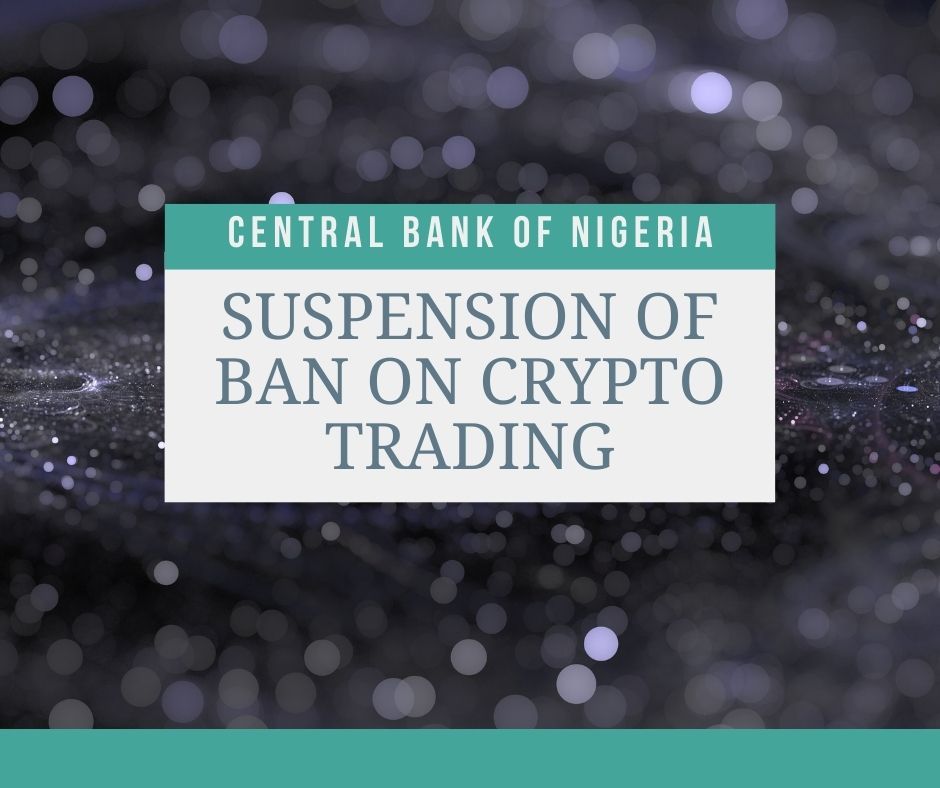CBN Suspends the Crypto Trading Ban in Nigeria


On the 5th of February, 2021, a circular was released by the Central Bank of Nigeria (CBN) banning all deposit banks, non-financial institutions and other financial institutions from trading in crypto currency. This ban was further stretched as the circular instructed financial institutions to close the accounts of persons or business entities transacting in crypto currency within their systems. It is important to note that this ban did not prohibit individuals from owning crypto currency as the CBN does not have the right to regulate ownership of cryptocurrency. This ban had a devastating effect on the growth of the Nigerian crypto market which, by the way, accounts for the world’s second largest Bitcoin trading volume.
One would assume that banks and other financial institutions would be hit the most by this policy; they were expected to kick against it, make statements and release articles to enlighten the government on why Nigeria’s economy needs a tech asset like crypto to grow. It is suspicious that a technology that has been described as the future of the financial industry was banned in Nigeria and the major financial players were quiet about it.
It seemed like individual crypto traders were hit the most by the ban on crypto trading Nigeria. Upon release of the circular, there was no holding back with comments on how insensitive the policy was, some even thought of the policy as a political conspiracy. Two days after the announcement, some traders woke up to the news that their bank accounts had been blocked by their commercial banks due to their involvement in crypto trading.
How did this policy from the world’s second largest Bitcoin trading country affect the Bitcoin? Well, 5 days after the policy, Bitcoin rose from $38,300 to $48,600. As expected, the naira fell. The price moved from 474 to 480 per USD in a really short time.
On the 13th of February, 2021, the central bank of Nigeria changed its mind and suspended the ban on crypto trading in Nigeria. People should be happy at this news, but everyone seems indifferent about it. Why did the CBN suspend the ban just 8 days after putting it up in the first place? The apex bank of Nigeria cannot be confused.
The CBN can’t stop crypto trading since they can only stop banks from facilitating the trade. Since it is not criminal to own and trade crypto for individuals, crypto trading will keep going on in Nigeria’s economy. The CBN cannot stop banks from facilitating customers’ cash transfer requests. Trading never stopped because of the policy in Nigeria, the policy only made peer to peer crypto trading more viable business for crypto traders. The CBN can deduce that this policy can’t effectively curb the trading of crypto in Nigeria.
$55million was raised by Nigeria’s Fintech industry in the first quarter of 2020 from foreign sources; between 2014 and 2019, Fintech raised over $600million. Nigeria’s Fintech industry has been a channel for the influx of foreign investors in Nigeria. In 2008, total investments in Fintech was $1.2billion, by 2014, investments had risen to $12billion, and in 2015 investments rose to $23billion. Crypto trading and investment in Nigeria has done for the Fintech industry what other financial technologies had not quite achieved in the past. The initial ban on crypto trading in Nigeria would create a big loss in Fintech and the Nigerian economy.
Maybe the ban was suspended by the CBN in order to find other suitable ways to regulate crypto currency in Nigeria or they have only started to see the potential relevance that cryptocurrency can still have on the Nigerian economy.
Either way, a lot of people are happy about this suspension, and the yays appear to outnumber the nays.
